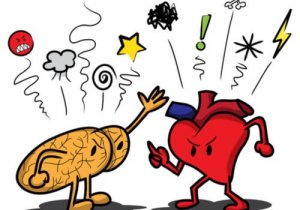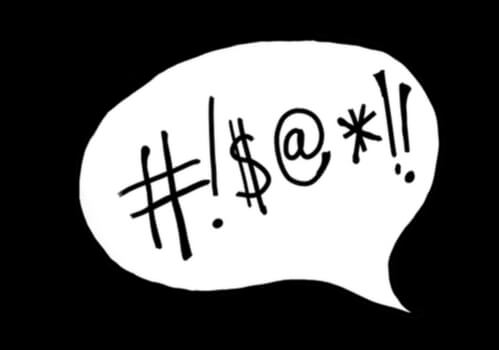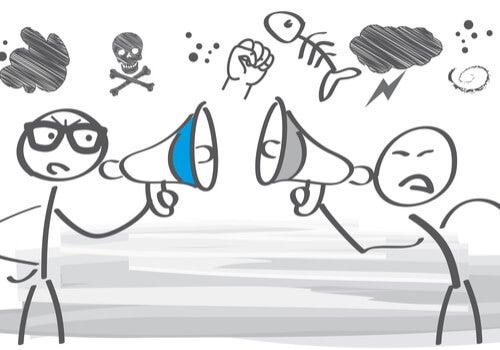The Science of Taboo Language: Swears and Curse Words

As a human being, you have an enormous capacity for communication. You’re not only able to share common information with others. You also have access to a large vocabulary and grammar. Those components allow you to be precise when transmitting ideas to others. It means you can conjugate into the past, present, and future in the same conversation. Not only that, but humans can use gestures or images to supplement their language abilities. But what about curse words?
Within the realm of language, there’s an area you could say is “dark”. That’s the place where you’ll find those offensive words people call “swears” or “curse words”. It seems that the person who uses them experiences an emotional discharge (cathartic effect).
What do we mean by “taboo”?
Taboo sounds like something that’s prohibited. It’s something that happens but isn’t a normal part of conversations. Sometimes, people don’t use these words because they don’t even know them. Other times, it might be due to shame or a desire to speak “properly”. Within the framework of the languages’ particular culture, people discourage their use. That’s why we can’t talk about taboos without talking about the cultural framework these taboos stem from.
As such, in countries of European culture, at least, people look upon swears and curse words negatively. People who are trying to behave politely and kindly will avoid using them. People also consider them a more masculine than feminine style. Furthermore, their “bad press” is closely related to the assumption that people who use them have trouble controlling their feelings. Many believe that only people who can’t manage their emotions appropriately use them. Those who can, they argue, are much more sophisticated in their speech.
On the other hand, the use of swear words is especially taboo in big cities. That’s because the inhabitants of such cities consider them to be characteristic of the uncultured and unrefined. In other words, people who use them fit the stereotype of the man in a field who’s used to manual work rather than intellectual pursuits. Remember that people also call curses and swear words “vulgar language”.

This stereotype is on wobbly legs. That’s because the use of curse words isn’t associated with the breadth of a person’s vocabulary. In fact, a study that Jay and Jay (2015) conducted discovered something that proved quite the opposite. They found that people who could produce a list of words on a common topic (for example, animals) were also good at cursing. In other words, they could also compose a relatively more extensive list of swears and curse words.
Beneficial effects of curse words
The beneficial effects of offensive words lie precisely in the fact that they break away from the norm. Thus, you might ask yourself what these supposed “benefits” are. Stephens et. al (2010) conducted a very interesting study on this issue. They divided volunteers into two groups. Then, they asked both groups to submerge their hands in icy cold water. After that, each person in the group had to try to keep their hands there for as long as possible.
The only variable between the two groups was that one of them could use swear words. The other could only say neutral words during the experiment. Do you know what happened? The group the researchers allowed to use curse words lasted almost twice as long as the control (neutral words) group. Yes, that’s right – twice as long. However, it’s worth noting that it seems people should use this analgesic effect in moderation.
These results agree with the hypothesis that the effect is related to a break from norms. Thus, breaking away from the norm many times would make it less of a norm. As such, your excitement at doing it would eventually die down.

Another piece of data that fits in with this theory is that expressing swear words makes you more excited when you do it in your mother tongue. They determined this by measuring the skin’s galvanic response. It matches the hypothesis because you can safely assume that your mother culture, just as your mother language, are more internalized inside you. In other words, it’s the place where you can find the “rawest” part of yourself.
As a human being, you have an enormous capacity for communication. You’re not only able to share common information with others. You also have access to a large vocabulary and grammar. Those components allow you to be precise when transmitting ideas to others. It means you can conjugate into the past, present, and future in the same conversation. Not only that, but humans can use gestures or images to supplement their language abilities. But what about curse words?
Within the realm of language, there’s an area you could say is “dark”. That’s the place where you’ll find those offensive words people call “swears” or “curse words”. It seems that the person who uses them experiences an emotional discharge (cathartic effect).
What do we mean by “taboo”?
Taboo sounds like something that’s prohibited. It’s something that happens but isn’t a normal part of conversations. Sometimes, people don’t use these words because they don’t even know them. Other times, it might be due to shame or a desire to speak “properly”. Within the framework of the languages’ particular culture, people discourage their use. That’s why we can’t talk about taboos without talking about the cultural framework these taboos stem from.
As such, in countries of European culture, at least, people look upon swears and curse words negatively. People who are trying to behave politely and kindly will avoid using them. People also consider them a more masculine than feminine style. Furthermore, their “bad press” is closely related to the assumption that people who use them have trouble controlling their feelings. Many believe that only people who can’t manage their emotions appropriately use them. Those who can, they argue, are much more sophisticated in their speech.
On the other hand, the use of swear words is especially taboo in big cities. That’s because the inhabitants of such cities consider them to be characteristic of the uncultured and unrefined. In other words, people who use them fit the stereotype of the man in a field who’s used to manual work rather than intellectual pursuits. Remember that people also call curses and swear words “vulgar language”.

This stereotype is on wobbly legs. That’s because the use of curse words isn’t associated with the breadth of a person’s vocabulary. In fact, a study that Jay and Jay (2015) conducted discovered something that proved quite the opposite. They found that people who could produce a list of words on a common topic (for example, animals) were also good at cursing. In other words, they could also compose a relatively more extensive list of swears and curse words.
Beneficial effects of curse words
The beneficial effects of offensive words lie precisely in the fact that they break away from the norm. Thus, you might ask yourself what these supposed “benefits” are. Stephens et. al (2010) conducted a very interesting study on this issue. They divided volunteers into two groups. Then, they asked both groups to submerge their hands in icy cold water. After that, each person in the group had to try to keep their hands there for as long as possible.
The only variable between the two groups was that one of them could use swear words. The other could only say neutral words during the experiment. Do you know what happened? The group the researchers allowed to use curse words lasted almost twice as long as the control (neutral words) group. Yes, that’s right – twice as long. However, it’s worth noting that it seems people should use this analgesic effect in moderation.
These results agree with the hypothesis that the effect is related to a break from norms. Thus, breaking away from the norm many times would make it less of a norm. As such, your excitement at doing it would eventually die down.

Another piece of data that fits in with this theory is that expressing swear words makes you more excited when you do it in your mother tongue. They determined this by measuring the skin’s galvanic response. It matches the hypothesis because you can safely assume that your mother culture, just as your mother language, are more internalized inside you. In other words, it’s the place where you can find the “rawest” part of yourself.
All cited sources were thoroughly reviewed by our team to ensure their quality, reliability, currency, and validity. The bibliography of this article was considered reliable and of academic or scientific accuracy.
Artículo de referencia
Bibliografía
Jay, K. L., y Jay, T. B. (2015). Taboo word fluency and knowledge of slurs and general pejoratives:
Deconstructing the poverty-of-vocabulary myth. Language Sciences, 52, 251-259.
Stephens, R., y Umland, C. (2011). Swearing as a response to pain: Effect of daily swearing frequency. Journal of Pain, 12, 1274–1281.
This text is provided for informational purposes only and does not replace consultation with a professional. If in doubt, consult your specialist.







